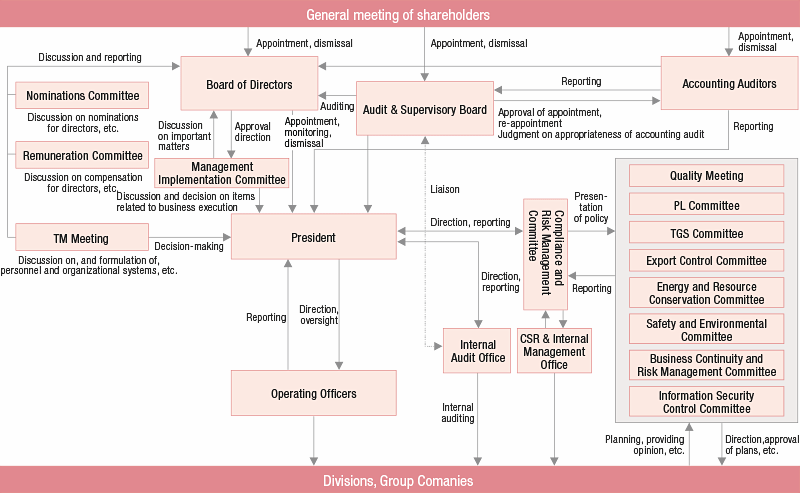Corporate Governance
Basic Policy for Corporate Governance
Since its foundation, the TAIYO YUDEN Group has implemented a management philosophy that focuses on “employee well-being,” “betterment of local communities” and “responsibility to provide returns to shareholders.” Over the years, we have strived to build strong relationships with all stakeholders, beginning with the Company's shareholders, with a strong focus on enhancing corporate value.
Considering the strengthening of corporate governance as the most important issue, the Company tries to make management more transparent with timely information disclosure, enhance compliance systems, and construct systems for ensuring speedy decision-making and execution of duties, as well as appropriate supervision and audit.
Structure of corporate governance

Review of Corporate Governance
- The Company has adopted the corporate auditor system, and has a Board of Directors, Audit & Supervisory Board and an accounting auditor. In order to ensure the transparency of its management oversight mechanism as it concerns Outside Directors and Outside Audit & Supervisory Board Members, the Company has strengthened its criteria for the election of Outside Directors by making its “Standards for the Independence of Outside Directors/Outside Audit & Supervisory Board Members” more rigorous based on consideration of the “Securities Listing Regulations” set forth by the Tokyo Stock Exchange Group together with other standards for independence set forth by other financial instruments exchanges and subsidiary organizations advising about the exercise of voting rights. Furthermore, the Outside Directors and Outside Audit & Supervisory Board Members work closely with the Audit & Supervisory Board and Internal Audit Office, thereby enabling the effective utilization of corporate audit functions and enhancing the functions of management oversight.
※ For more details concerning the independence criteria for Outside Directors and Outside Audit & Supervisory Board Members, please refer to “Selection Criteria for Outside Directors/Outside Audit & Supervisory Board Members” on the TAIYO YUDEN website. - The Company established the operating officer system and has Operating Officers in place so as to separate supervising function from operating function.
- Principal meetings and roles of committees are as follows.
- Management Implementation Committee
In the Management Implementation Committee, Operating Officers in charge of business operations deliberate and determine policy matters related to operations of group management. - TM Meeting
In the TM Meeting, consisting of Directors with a rank of Executive Operating Officer or higher, and Directors who are in charge of personnel matters, matters concerning personnel, organizations, and remuneration for the entire Group are deliberated and determined, and matters concerning important management policies are deliberated in advance. - Nominations Committee
The Nominations Committee nominates candidates for Directors, Corporate Auditors, and Operating Officers, and deliberates matters related to election of Representative Directors and Directors. The Committee is chaired by an Outside Director who is an Independent Officer to ensure objectivity of each deliberated matter. - Remuneration Committee
The Remuneration Committee deliberates systems of remuneration to Corporate Officers, as well as details of remuneration to each Corporate Officer. The Committee is chaired by an Outside Director who is an Independent Officer to ensure objectivity of each deliberated matter. - Compliance and Risk Management Committee
The Compliance and Risk Management Committee consisting of Directors and Operating Officers discusses activities to improve systems concerning internal control, relevant instructions, and their progress management.
- Management Implementation Committee
This website contains forward-looking statements. These forward-looking statements are not guarantees of future performance, and they involve inherent risks and uncertainties.
A variety of factors including changes in the business environment could cause actual results to differ materially from those in the forward-looking statements.














